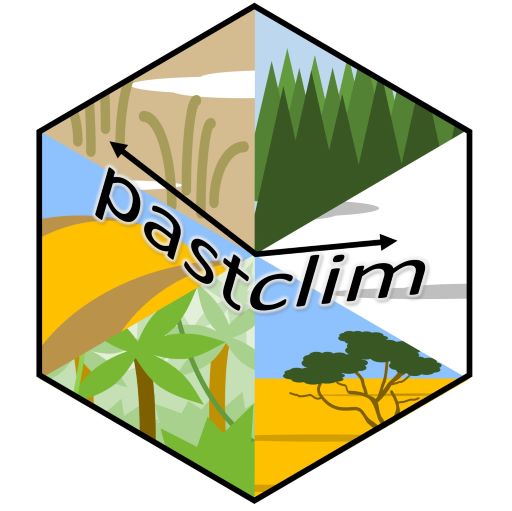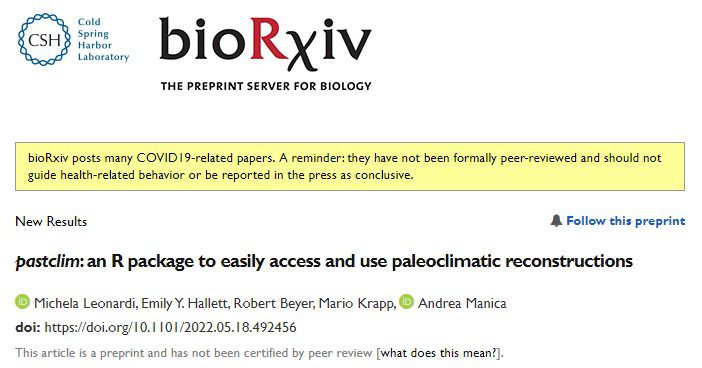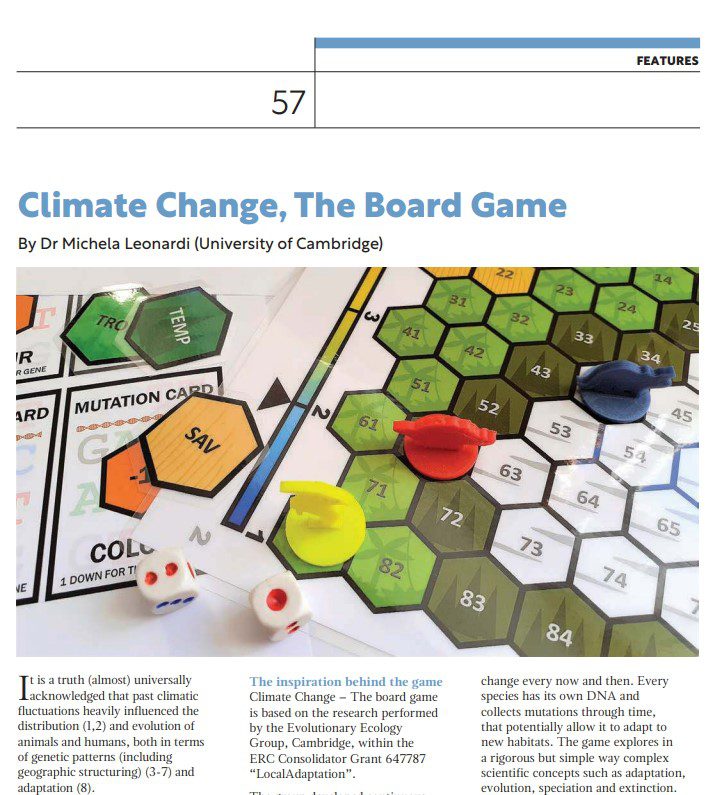Yesterday I gave a talk for the Department Day, at Cambridge Zoology. I presented the results of an ongoing project, “The palaeoecology of survival and extinction”. I loved presenting to my colleagues in person after such a long hiatus!



Yesterday I gave a talk for the Department Day, at Cambridge Zoology. I presented the results of an ongoing project, “The palaeoecology of survival and extinction”. I loved presenting to my colleagues in person after such a long hiatus!



It is now out in bioRxiv a new preprint describing pastclim, an R package facilitating the access and the use of palaeoclimatic data, that I co-developed.
Michela Leonardi, Emily Y. Hallett, Robert Beyer, Mario Krapp, Andrea Manica
pastclim: an R package to easily access and use paleoclimatic reconstructions
bioRxiv 2022.05.18.492456; doi: https://doi.org/10.1101/2022.05.18.492456

Recently, the development of continuous palaeoclimatic reconstructions covering hundreds of thousands of years has made it possible to integrate the climate in the past into studies of many different disciplines: from paleoecology to linguistics, from archaeology to conservation biology, and from population genetics to human evolution.
Unfortunately, however, climate data can be difficult to extract and analyze for scholars unfamiliar with the specific formats in which it is shared. Together with my colleagues from Cambridge and Jena, we addressed this problem by creating pastclim: an R package that facilitates the access and use of two sets of paleoclimate reconstructions covering the last 120,000 and 800,000 years, respectively.
The package contains a set of functions that allow you to quickly and easily recover the climate of specific areas for periods of interest, extract climatic data of points scattered in space and/or time, recover historical series from single sites and easily manage perennial ice and coastlines.
The preprint contains two examples (the code in R and associated data can be downloaded from here). In the first one, we show how to extract the climate reconstructions for a single archaeological site with dated stratigraphic layers, i.e., in one location for multiple time slices. In the second one, we show how to analyse a larger number of sites with lower individual coverage, i.e., a number of points scattered in space and time.
website: https://evolecolgroup.github.io/pastclim/index.html
github: https://github.com/EvolEcolGroup/pastclim
vignette: https://evolecolgroup.github.io/pastclim/articles/a0_pastclim_overview.html
pastclim is not on CRAN.
[update 16/01/2023: pastclim is now on CRAN ]
Michela Leonardi, Emily Y. Hallett, Robert Beyer, Mario Krapp, Andrea Manica
pastclim: an R package to easily access and use paleoclimatic reconstructions
bioRxiv 2022.05.18.492456; doi: https://doi.org/10.1101/2022.05.18.492456

The recent development of continuous paleoclimatic reconstructions covering hundreds of thousands of years paved the way to a large number of studies from disciplines ranging from paleoecology to linguistics, from archaeology to conservation and from population genetics to human evolution. Unfortunately, such climatic data can be challenging to extract and analyze for scholars unfamiliar with such specific climatic file formats.
Here we present pastclim, an R package facilitating the access and use of two sets of paleoclimatic reconstructions covering respectively the last 120,000 and 800,000 years. The package contains a set of functions allowing to quickly and easily recover the climate for the whole world or specific areas for time periods of interest, extract data from locations scattered in space and/or time, retrieve time series from individual sites, and easily manage the ice or land coverage.
The package can easily be adapted to paleoclimatic reconstructions different from the ones already included, offering a handy platform to include the climate of the past into existing analyses and pipelines.
Enza Spinapolice invited me to contribute a seminar to the Module “Palaeolithic archaeology” (MSc/MA level) at “La Sapienza” University of Rome.
I gave a talk entitled “La ricetta dell’interdisciplinarietà” (The recipe for interdisciplinarity), and it was followed by a long and lively discussion. Thank you Enza for giving me this exciting opportunity!




Climate Change – the board game is featured in the February 2022 issue of the Genetics Society Newsletter. The Editor, Margherita Colucci invited me to write a short text to describe the game and the science behind it. You can read it on page 57 of the Newsletter

Bringing to light – women in climate science selected my project on Neanderthal paleoecology among the winners!
When we talk about climate change, we often focus on the challenges we are facing today (and tomorrow). But it is important to remember that knowing the past helps us understand the present and find the best strategies to face the future.

